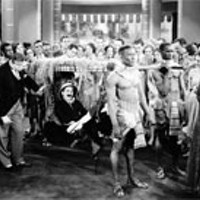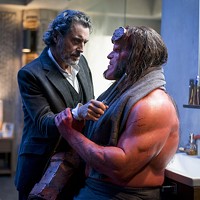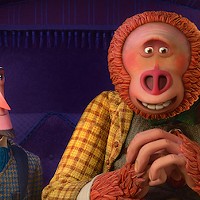

Actually, most of Monster's Ball is moving, albeit in ways that are often hard to take. A relentless downer on the order of Affliction, this new release echoes that 1998 Paul Schrader drama in that it, too, focuses on the male members of a highly dysfunctional family. In this case, it's the Grotowskis, whose men have for several generations all served as corrections officers at a rural Georgia prison. Buck Grotowski (Peter Boyle) is the patriarch, a racist relic of a time when it was as easy to hang a black man as to spit on one. Like James Coburn's character in Affliction, Buck is the cancer that's slowly eating away most of the noble traits that otherwise might be found in his son Hank (Billy Bob Thornton). Perhaps not as bigoted as his dad -- but then again, not exactly anybody's first choice to lead a parade on Martin Luther King Day -- Hank tolerates his father but openly loathes his own child Sonny (Heath Ledger), who he feels is weak and an embarrassment.
For his part, Sonny emerges as the most likable of the trio: He's handsome, sensitive and open-minded, qualities that would allow him to succeed were he in another occupation, another town, and especially another family. But in this dead-end existence, he can only pass the time taking abuse from Hank, banging the local hooker (who, as we queasily note later, turns out to be alternately servicing both Sonny and his dad), and prepping Death Row inmates for their final moments on earth. The latest dead man walking turns out to be Lawrence Musgrove (Sean Combs, aka Puff Daddy, aka P-Diddy, aka Get A Life Already), who's been on Death Row for over a decade -- and whose wife Leticia (Halle Berry) and son Tyrell (Coronji Calhoun) have been dutifully visiting him over the years.
The specter of Death turns out to be a central character in the film, as more than one principal comes to an unseemly end during the movie's first hour. It's heavy going, yes, but it also sets the stage for a burgeoning relationship between Hank, whose sudden desire for redemption brings out his finer qualities, and Leticia, who needs a sympathetic soul to help ease the endless stream of agonies that seem to always find their way to her door.
Director Marc Forster and writers Will Rokos and Milo Addica are all relative newcomers on the film scene, and perhaps it's this infusion of fresh blood that allows Monster's Ball to transcend plot developments that might have come off badly had they been entrusted to veteran Hollywood filmmakers comfortable with smoothing out all the rough edges. Indeed, a couple of coincidences might have been hard to swallow in another context, but here they're approached in such a straightforward and unfussy manner that they're no less believable than those inspiring real-life tales that pop up in the Sunday newspapers every now and then.
It's been reported that the actors involved decided to forego their regular salaries in order to fit into this picture's minuscule budget, and why not? Roles this rich don't come along every day. Certainly, Berry has never delivered a better performance -- frankly, I didn't think she had this one in her -- and the scene in which she's able to convey her character's drunken anguish while somehow underplaying the usual actorly tics of inebriety is simply mesmerizing.





